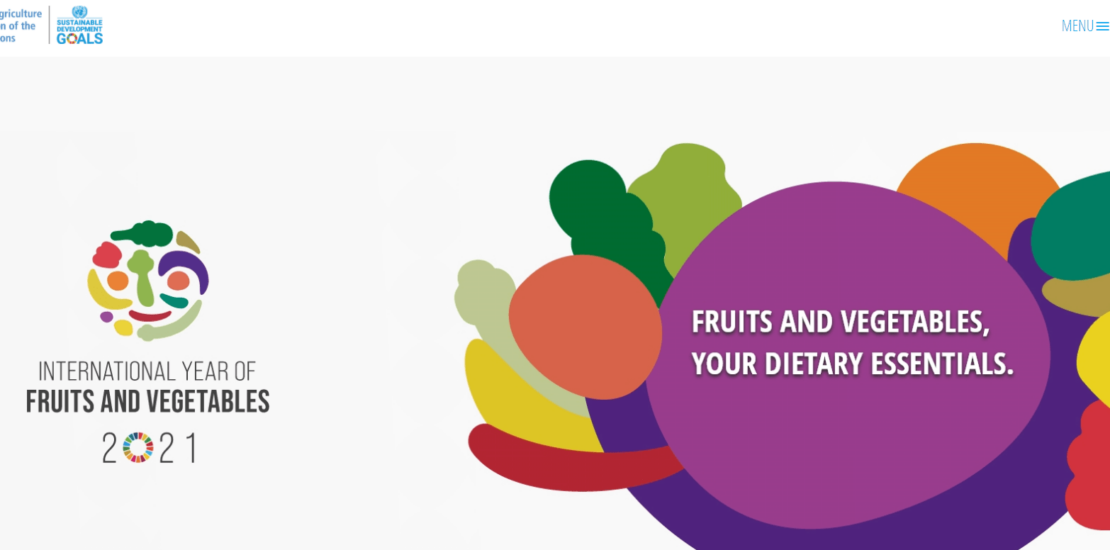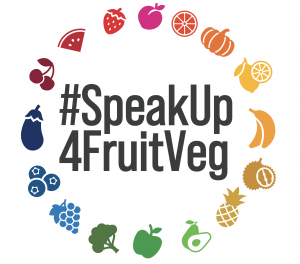IYFV 2021 – Fruits and vegetables, your dietary essentials
- 18/01/2021
- Posted by: Gaetan Dermien
- Category: Africa, Caribbean, News, Pacific

At its 74th session, the United Nations General Assembly proclaimed 2021 the International Year of Fruits and Vegetables (IYFV). The IYFV is a unique opportunity to raise awareness on the important role of fruit and vegetables in human nutrition, food security and health, and in achieving the United Nations Sustainable Development Goals.
At the (virtual) Official Launch Event of IYFV 2021 on 15 December 2020, the Director-General of the Food and Agriculture Organization (FAO), QU Dongyu, made an appeal to improve healthy and sustainable food production through innovation and technology, and to reduce food loss and waste.
FAO has produced a background paper that outlines the benefits of fruit and vegetable consumption, and examines the various aspects of the fruit and vegetable sector from a food systems approach: from sustainable production and trade to loss and waste management. It highlights the interlinkages of stakeholders and key issues to be considered for action during the IYFV.

Freshfel Europe is encouraging the EU fruit and vegetable community and beyond to support this important international year, and will be running a digital campaign – #SpeakUp4FruitVeg – targeted at EU decision-makers to better support the sector in EU policy-making.
COLEACP’s mission in harmony with IYFV 2021

The key messages of IYFV 2021 resonate with COLEACP’s long-term focus on inclusive horticultural value chains; innovative technologies to reduce loss and waste; economic, environmental and social sustainability; and promotion of fruit and vegetables as source of balanced nutrition. COLEACP’s planned activities for IYFV 2021 will be published at and as the year progresses.
The main messages of IYFV 2021 are:
- Harness the goodness
Fruit and vegetables have multiple health benefits, including strengthening the immune system, that are essential for combating malnutrition and preventing noncommunicable diseases. - Live by it, a diverse diet
Fruit and vegetables should be consumed in adequate amounts daily as part of a diversified and healthy diet. - Respect food from farm to table
The high perishability of fruits and vegetables needs special attention to maintain their quality and safety through appropriate treatment and handling across the supply chain from production to consumption in order to minimise loss and waste. - Innovate, cultivate, reduce food loss and waste
Innovation, improved technologies and infrastructure are critical to increase the efficiency and productivity within fruit and vegetable supply chains to reduce loss and waste. - Foster sustainability
Sustainable and inclusive value chains can help to increase production and to enhance the availability, safety, affordability and equitable access to fruit and vegetables to foster economic, social, and environmental sustainability. - Growing prosperity
Cultivating fruit and vegetables can contribute to a better quality of life for family farmers and their communities. It generates income, creates livelihoods, improves food security and nutrition, and enhances resilience through sustainably managed local resources and increased agrobiodiversity.

![EU and GB approval changes (January-March 2025) 9-FFM+-[ENG]](https://news.colead.link/wp-content/uploads/2024/06/9-FFM-ENG-150x150.jpg)
